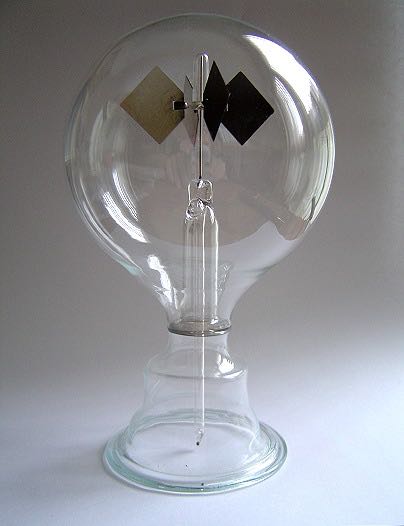A radiometer is a scientific instrument that allows the measurement of electromagnetic radiation intensity. The Crookes radiometer, or light mill, is a special type of radiometer that spins when exposed to light.
The Crookes radiometer consists of a rotor with vanes inside a partially vacuumed glass bulb. It is solar-powered because its vanes are spinning when exposed to sunlight. Moreover, the radiometer can spin in the presence of an artificial light source or infrared. For example, the heat generated by your hand could be sufficient to make the radiometer spin.
This type of radiometer is often used by physics teachers to demonstrate how radiative energy from light can be converted into a kinetical force. Because of its beauty and simplicity, it is also a fascinating educational toy that will certainly catch kids’ attention!
Table of Contents
The invention of the Crookes radiometer
The Crookes radiometer was invented by… obviously Crookes himself! Sir William Crookes did not only have a funky mustache, he also discovered one of the elements of the periodic table: thallium!
He invented the Crookes radiometer in 1873 while working in a chemistry lab. He noticed that the light could affect weighting measurements when he was weighing samples in a negative-pressure chamber. Crookes then went on to study this phenomenon leading him to the invention of the Crookes radiometer.
How does a Crookes radiometer work?
The original explanation provided by Crookes was the radiometer was spinning due to the pressure of light (1). However, this theory was later shown to be false. Instead, the correct explanation relies on the thermal transpiration theory by Osborne Reynolds (2).
Since the vanes of the Crookes radiometer are black on one side and the other side is white, these surfaces will not react the same way when exposed to light. The black surface will absorb more light and its surface will become hotter than the reflecting white side. As a result, the edges will behave like pores through which hot air will flow from the hot side to the cold side. This is the true reason why the rotor of the Crooks radiometer is spinning.
This radiometer is therefore more of a heat engine converting thermal energy to mechanical energy. However, don’t be fooled by the term engine. The forces at work in a Crookes radiometer are really weak! For example, you certainly wouldn’t be able to generate electricity with this machine. In fact, this is also why the rotor needs to be placed into a partially vacuumed glass bulb because air friction would be sufficient to inhibit its rotation (3).
Best Crookes radiometers for sale:
Crookes radiometers are great educational tools and would make the perfect gift for kids to get them more interested in science and STEM. You can easily order a radiometer online via Amazon or AliExpress to name a few.
Dorami Crookes radiometer available on Amazon
Check this Dorami Crookes radiometer on Amazon
This Crookes radiometer is the most popular on Amazon and it works very well. It is indeed rated 4.6 out of 5 with over 150 ratings. Moreover, this radiometer is a beautiful scientific object to display and it will definitely catch everyone’s attention.
Since the radiometer is made of glass, it is not recommended for children under 14 years old. This radiometer measures 6.3 x 4.09 x 4.02 inches and it weighs approximately 3.87 ounces.
One cool thing about this radiometer is that it is available in different colors. In addition to a clear glass axis, this radiometer is available in different colors including blue, green, and orange.
For less than $40 with free shipping from Amazon, this radiometer is definitely one of the best buying options out there.
Crookes radiometer available on AliExpress
This Crookes radiometer is the most popular on AliExpress. It is rated 4.9 out of 5 with over 130 reviews. This item is similar to the last one, except that the base is taller. This radiometer measures 8 inches tall with a 3.5 inches diameter.
I personally like the tall base and I think that overall, I prefer this radiometer. Buyers are also extremely satisfied with the packaging, shipping, and overall quality of this radiometer. For less than $20, it is definitely hard to find anything better than that!
Conclusions
I hope that you enjoyed learning more about these Crookes radiometers. Feel free to share your thoughts or ask questions down below in the comment section. Please also have a look at my previous posts to learn about light refraction through a prism or to see how to generate electricity with a thermoelectric Peltier device.
References and additional info
1- Crookes, William (1874). On Attraction and Repulsion Resulting from Radiation. Philosophical Transactions of the Royal Society of London. 164: 501–527.
2- Reynolds, Osborne (1879). On certain dimensional properties of matter in the gaseous state. Philosophical Transactions of the Royal Society of London. 170: 727–845.
3- Wikipedia page for radiometers.
Photo cover credit

